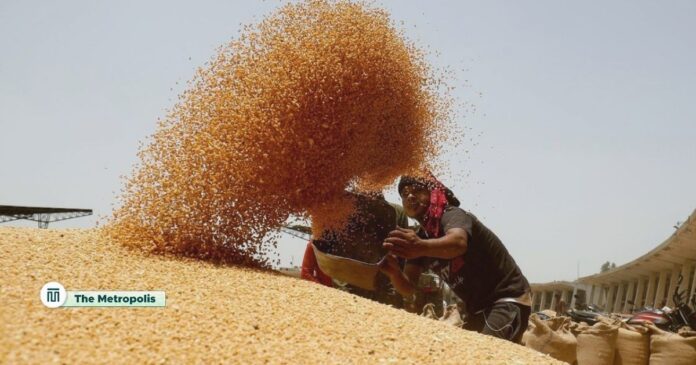Bangladesh has experienced over a dozen extreme weather events since May of last year, including four cyclones, nine floods, and numerous periods of intense rain, heat, and cold. These events are now posing a threat to food security.
According to agriculturists and economists, these catastrophes impacted the economy in addition to harming individual farmers and food security.
The latest report from the Food and Agriculture Organization states that food security is likely to remain precarious due to ongoing economic constraints, high inflation, and the likelihood of monsoon-season weather extremes, like cyclones.
However, the FAO report suggests that the country might have to import cereals in 2024-2025. Fortunately, the country did not have to import cereals during the previous fiscal year.
A farmer in Kamalganj, Moulvibazar, named Humayun Kabir has experienced four floods this year. The floods have destroyed the Aman crop he planted. The time to plant the crop is running out, and he currently has no seedlings.
Humayun told The Daily Star that sand and silt had accumulated on the field, leaving the majority of his fields deserted.
Extreme weather events have harmed four to fifteen percent of crops in seven to fifty districts since May of last year, according to the Department of Agriculture Extension.
Just before the plants were due to flower, the DAE estimates that the two recent floods in the Chattogram, Sylhet, and Mymensingh divisions destroyed an estimated yield of roughly 10 lakh metric tonnes of Aman.
August and September saw unprecedented flooding in the eastern region.
A farmer in the Fulgazi upazila of Feni’s Sreechandapur village, Mujibul Haque, asserted that they had destroyed Aman’s four acres.
“I could later plant the late Aman variety on only 66 decimals of land,” he declared. This year, Allah knows how I will manage my family,” he declared.
Based on an analysis by the Centre for Policy Dialogue (CPD), the eastern flood caused at least Tk 14,421.46 crore in damages. The agriculture and forestry sector sustained the most damage, amounting to Tk 5,169.71 crore.
Cyclone Remal’s intense rains and strong winds damaged 4 percent of all crops in 50 districts on May 26 and 27, this year, including Aus, Aman seedlings, maize, jute, sesame, mungdaal, peanuts, vegetables, fruits, and spices.
This year, flooding in seven districts in the Sylhet and Rangpur division from June 19 to June 23 damaged 14% of crops, including vegetables, Aus, and Aman seedlings.
A further flood that damaged 13 percent of all crops struck 14 districts in the country’s north, northeast, and southeast just seven days later.
A further round of floods and torrential rains in August damaged 15% of all crops across 23 districts in the northeast, south, southwest, and southeast regions.
After that, 16 districts experienced severe rains from September 12–19, which harmed about 1% of all crops.
According to the DAE, Cyclone Remal and the floods in 2024 totaled Tk 6,968.95 crore in crop damage.
Bangladesh produced 3.91 crore metric tonnes of rice last year, compared to 3.70 crore metric tonnes of demand. However, by the end of August, the US Department of Agriculture warned that the floods, especially in the eastern region, could cause Aus and Aman rice production and acreage in Bangladesh to drop.
Aman acreage decreased marginally from 57.5 lakh hectares to 57.35 lakh hectares this season, according to DAE estimates.
Experts warn that if the government doesn’t reach its target of 1.78 crore tonnes of Aman this year, food security could be at risk.
After the floods in the eastern region, the government gave farmers Aman seedlings, but the goal might not be met, according to Niaz Md Farhat Rahman, principal scientific officer at the Bangladesh Rice Research Institute’s (BRRI) Agriculture Statistics Division.
“The late Aman may also affect the next rice season in Boro,” he stated.
Shahidul Islam, an agro-meteorologist with the Bangladesh Meteorological Department, believes that changing weather patterns could affect crop production.
He told The Daily Star that the first week of October has been extremely rainy so far this year.
“The years 2003, 2006, 2018, and 2022 were extremely dry, while the years 2004, 2007, 2017, 2020, and 2024 were extremely wet,” he said.
“Very dry or very wet years hamper crop production,” said him.
According to Shahidul, aman paddy requires 20–36 degrees Celsius during the day and 20–23 degrees at night for growth and flowering.
The nighttime temperature was between 23.9 and 25.7 degrees Celsius last week, he said, even though the daytime temperature was within this range.
BRRI’s Niaz said, “It will be difficult for us to have stable production of food unless we are capable of dealing with the changes in weather and climate patterns.”
He stated that in order to take advanced measures to protect crops, it was crucial to strengthen the early warning system.
The DAE, the Water Development Board, the Department of Meteorology, and other agriculture research systems must work together closely, he said.
According to Muntaseer Kamal, a CPD Research Fellow, harm to agriculture could significantly impact food security and inflation. He suggested that the government make it easier for farmers to obtain agricultural loans and guarantee a supply of seeds and other farming supplies in order to boost food production.
He advised the government to lower import taxes on commodities and agricultural inputs and to act quickly to import rice.



